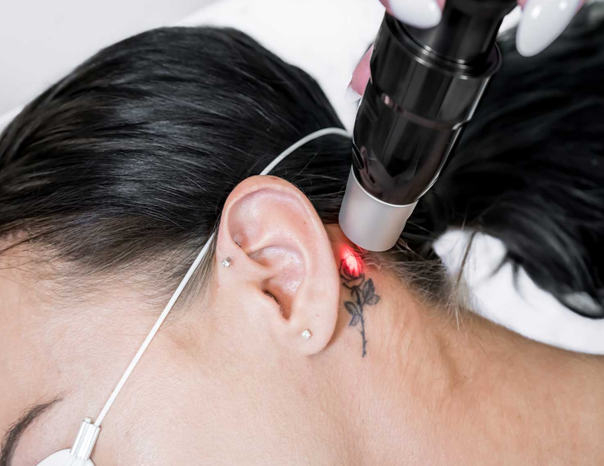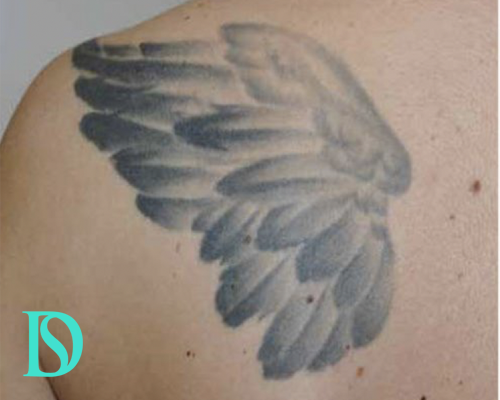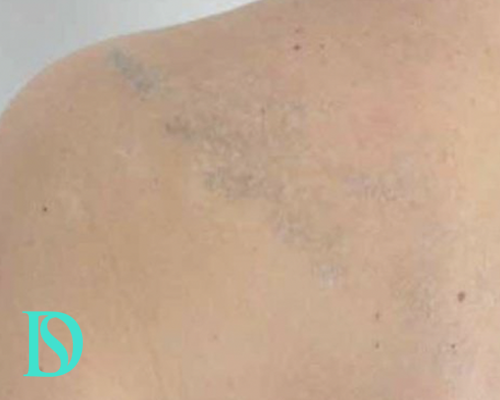Treatment at Derma Solution
Tattoo Removal

Tattoo Removal
At Derma Solution we use advanced laser technology to remove tattoos. Laser tattoo removal is simple, safe, and produces fantastic results. The advanced technology works by allowing the light produced by the laser to pass through the skin and break up the tattoo ink into tiny particles. The body then disposes of these fragments via its immune system.
Here at Derma Solution we accept nothing other than the best standard of pre-treatment, treatment and aftercare. Every year our team of highly trained practitioners conduct many tattoo removal procedures.
Treatment Process
It usually takes several treatment sessions to ensure success, with minimum 6 weeks intervals between sessions. We’ve also got access to the latest Pico lasers if you want even quicker results. If you decide to go ahead after your consultation, we can start off with a test patch.
Several factors come into play when considering removing a tattoo. We are committed to providing you with the best treatment plan specific to your needs. Arrange for a free consultation today to see how we can help.
Treatment Areas
- Everywhere.
Summary of Your Treatment
Procedure Time:
Various
Back to Work:
Immediate
Anaesthetic:
Topical
Full Recovery:
(Talked about removing this)
Sensitivity Period:
24 hours estimated
Duration of results:
Long Term Results
Risks and Complications:
Redness & Irritation
Book Now:
Procedure Time:
Various
Back to Work:
Immediate
Anaesthetic:
Topical
Full Recovery:
(Talked about removing this)
Sensitivity Period:
24 hours estimated
Duration of results:
Long Term Results
Risks and Complications:
Redness & Irritation
Book Now:


Price GuaranteeOn All Treatment
Derma Solution offers a price guarantee on all of our treatment ranges. If you are able to find a treatment that we offer cheaper anywhere in Copenhagen we will match the price.
Tattoo Removal
Treatment Prices
-
Veryminor (1-3 cm) DKK 1,999
-
Minor (4-8 cm) DKK 3,499
-
Intermediate (9-15 cm) DKK 4,499
-
Major (16-20 cm) DKK 2,750
-
Consultation DKK Free
Tattoo Removal
Frequently Asked Questions
Unfortunately, no method of tattoo removal is completely pain-free. Laser tattoo removal has been likened to the feeling of having a rubber band repeatedly snapped against the skin. Others describe it as a rapid succession of sharp pinpricks, or a warm, prickly sensation. Because a lot of energy is needed in order for the laser to break up the ink particles under your skin, this treatment can be uncomfortable for some people. Your skin will also need 6 – 12 weeks to recover between treatments.
Lasers remove tattoos by penetrating the skin and breaking up the ink into tiny particles. After several treatments (with regular intervals between sessions), the body breaks down and removes the pigment in the tattoo, causing it to fade.
Laser tattoo removal may not be suitable for you if you have a dark skin tone; this is due to the potential of the treatment leaving a ‘ghosting’ effect, where the skin is lighter than the surrounding area. Our practitioners can assess your tattoo and determine which solution is most appropriate in a free consultation. In some cases, the most appropriate form of removal for a tattoo could be excision. This involves having the tattoo surgically removed using a scalpel. Although more invasive, it can sometimes be the most effective solution and may also be quicker.
A tattoo can be faded adequately to re-cover after a couple of sessions. Your practitioner will be able to advise how many sessions you are likely to need during your consultation.
The ink particles of the tattoo will have been injected deep into the dermis (the second layer of skin). In order to reverse this process effectively, the pigment within the skin needs to be broken down using targeted lasers. Don’t be fooled into believing that if you have a change of heart shortly after getting your tattoo it can be easily removed.
Yes, it’s very safe. The laser energy is selectively absorbed by the tattoo ink only, meaning that surrounding tissues are not affected and there is no lasting damage to the skin.
Other tattoo removal methods do not involve lasers. We do not recommend the following methods of tattoo removal because they can cause scarring and have a high risk of infection.
Tattoo removal creams – these work by dissolving the tattoo using chemicals such as hydroquinone, kojic acid, alpha arbutin and TCA. They cannot completely remove a tattoo, but may reduce its appearance in some cases. Dermabrasion tattoo removal – this involves using an abrasive device to blast the surface of the skin in order to break down the tattoo and remove the top layers of skin. A local anaesthetic is usually administered as this is a painful method of removal. Salabrasion – this works in a similar way to dermabrasion but involves applying water and salt in addition to an abrasive device in order to lift and remove layers of skin. Acid tattoo removal – some people are now using acids, similar to those used in chemical skin peels, to burn away layers of the skin in order to get rid of their tattoos. Many health professionals strongly advise against this method.
Important information
This treatment must be performed by a trained aesthetician. Our Body Specialists are trained aestheticians that specialise in aesthetic, non-surgical, non- invasive body transformation procedures.



